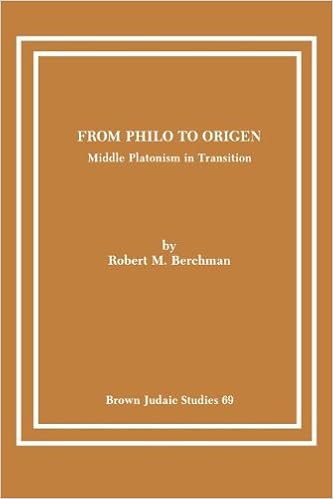Thursday, November 15, 2018
On "From Philo to Origen" by Robert M. Berchman **
This book is little more than a photostat of a dissertation. As such, it's double-spaced and shrunk down to fit a six-by-nine binding, which makes for difficult reading. That's too bad in some ways, as what Berchman has to say is important and useful. As the title suggests, Berchman traces through the influence of Plato from Philo to Origen, in the period known as Middle Platonism, one in which both the Jewish religion and the Christian were coming into being. Alas, it is not a book for casual readers or even mainstream readers; that one is still to be written. This is one for the scholars, preferably ones who know Greek and Latin, since Berchman often quotes from the vernacular without translation.
I would split the book into three main parts, with the first two being split into three parts each and the last part being split into two. The first section discusses conceptions of God, first in Philo, then in Clement of Alexandria, and finally in Origen. The gist of it is that all three, to some extent, apply Platonic ideas to Biblical concepts and to their beliefs about who God is and how his creation came about. Most pertinent here is Philo's dialogue Timaeus. God the Father, as First Principle, has no direct contact with the physical; his Logos, his reason and mind, is begotten and creates the things of physical substance. Or something like that. This was not easy reading.
The second section discusses ideas about knowledge--again in Philo, Clement, and Origen. The basic premise is that they write in Scripture as the ultimate form of knowledge, which goes beyond that which can be gained by physical senses to that which is the mind of God. Another short section discusses rhetoric--and how their use of it was Platonic.
Finally, the last section of the book provides a long excerpt from Origen's Periarchon, after which the author analyzes it to show how Origen is actually arguing against Stoic concepts of knowledge and of God in favor of Platonic concepts, as based within scripture.
Labels:
Books,
Early Christianity,
Nonfiction,
Robert M. Berchman
Subscribe to:
Post Comments (Atom)







No comments:
Post a Comment